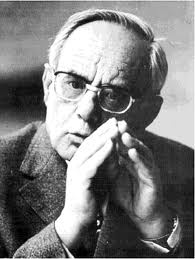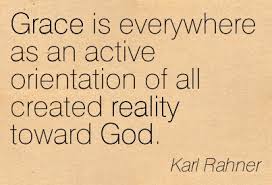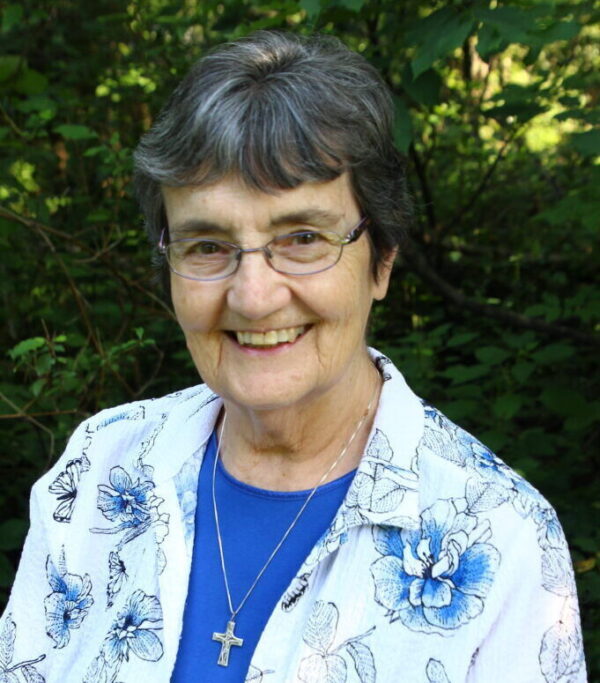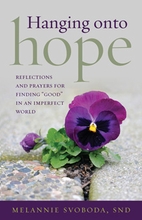The German theologian, Karl Rahner, has been called “The Father of Roman Catholic Theology of the 20th Century.” Although he never wrote an autobiography, he was interviewed on German television in 1984 shortly before he died at age 80. I just finished reading the transcript of that interview in the slender book entitled I Remember.
Rahner was born in Frieburg, Germany on March 5, 1904, the middle of seven children. His father Karl was a college professor, his  mother Luise (Trescher) a devout woman he once called “courageous.” At age 18 he entered the Jesuits, following in the footsteps of his older brother Hugo. After ordination and many years of study, Rahner taught theology in Innsbruck, Munich, and Munster. Over the years he also wrote prolifically (he has an estimated 4,000 published works) and lectured all over the world. In 1962 his creative and non-traditional approach to theology got him into trouble with the Vatican who informed him he could no longer write or lecture without their prior permission. But this censorship was short-lived, for a few months later Pope John XXIII (who was canonized this past Sunday) appointed Rahner a peritus (expert advisor) to the Second Vatican Council.
mother Luise (Trescher) a devout woman he once called “courageous.” At age 18 he entered the Jesuits, following in the footsteps of his older brother Hugo. After ordination and many years of study, Rahner taught theology in Innsbruck, Munich, and Munster. Over the years he also wrote prolifically (he has an estimated 4,000 published works) and lectured all over the world. In 1962 his creative and non-traditional approach to theology got him into trouble with the Vatican who informed him he could no longer write or lecture without their prior permission. But this censorship was short-lived, for a few months later Pope John XXIII (who was canonized this past Sunday) appointed Rahner a peritus (expert advisor) to the Second Vatican Council.
Many say that Rahner was one of the key figures at the Council. When told this, Rahner said humbly, “I think that’s an exaggeration…there were a lot of cooks at the Council.” He once referred to himself as someone who was “not particularly industrious,” who “went to bed early,” and was a “poor sinner.” Besides his humility, what else impresses me about this great theologian? First, he related theology to the joys and challenges of contemporary living. In doing so he was living St. Ignatius’ counsel to “find God in all things. ” Rahner  wrote, “All life is a subject of theological reflection.” (Anecdote: Rahner loved ice-cream—most especially Italian gelato. This indulgence raised a few eyebrows. Rahner, quoting an anonymous Jesuit, said: “The good things in life are not only for the rascals!”)
wrote, “All life is a subject of theological reflection.” (Anecdote: Rahner loved ice-cream—most especially Italian gelato. This indulgence raised a few eyebrows. Rahner, quoting an anonymous Jesuit, said: “The good things in life are not only for the rascals!”)
Central to Rahner’s theology is the belief that at the core of every person’s deepest experience is God, “whose mystery, light, and love have embraced the total person.” He believed this experience of God forms the “undertow of daily life” even when we are not aware of it. Interestingly, Rahner did not like to use the word “God.” He preferred “Absolute Mystery.” He also said that God’s self-revelation to humanity does not resolve the Mystery of who God is; it only increases our recognition of God’s incomprehensibility.
Rahner placed a great emphasis on personal prayer. His first published article was entitled “Why We Need to Pray.” Another book on prayer, Encounters with Silence, was my favorite book as a novice, and it continues to be a favorite of mine. Rahner was also keenly sensitive to people around him. Throughout his life he unobtrusively raised money for individuals in need. At his 80th birthday  celebration, for example, he appealed to his guests for donations to buy a motorcycle for a priest in Africa.
celebration, for example, he appealed to his guests for donations to buy a motorcycle for a priest in Africa.
In this interview for German TV, Rahner spoke about growing old and dying. He talked about his diminishing energy: “If I realize that I can no longer climb 15,000-foot mountains, then I’ll simply stay at the base. If I can no longer really do productive intellectual work six hours a day, then I’ll simply work only two or three hours and be satisfied with that.” His interviewer asked, what if you are not able to work at all? Rahner recalled the example of St. Albert the Great who, despite his volumes of theological writings, at the end of his life, could only pray the Hail Mary. As you get close to death, said Rahner, “you find yourself all the more in the hands of God, and no longer in your own. And you are better protected and more secure in God’s hands than where you think you must be in control at all costs.”
On March 30, 1984, a few weeks after celebrating his 80th birthday, Karl Rahner died, surrendering himself into the arms of “the absolute, everlasting, holy, eternally good God.”
Is there anything in this reflection that moved you or resonated with you?







29 Responses
Sr. Melannie,
The idea of the future Christain being a mystic resonated with me. More and more I see the need for silence and contemplation in my own life.
Great reflection!
Kathleen
Thank you for calling our attention to Rahner’s quote on being a mystic. It is a grace to feel the need for silence and contemplation in one’s own life. Thank you for writing! Sr. Melannie
Melannie, Loved the summary of the German interview with Rahner. I have admired him “from afar.” I feel like I have come to know him a little better having read your article. Thanks, Friend! Nice job as usual!
Shauna
Thank you, Shauna! Rahner is someone worthy of admiration! Melannie
Melannie,
After reading your blog this morning I picked up again a book I have of Rahner’s entitled, Prayers for a Lifetime. One of my favorite essays in that book is “God Of My Prayer. ” Rahner is talking with God about his prayer and lamenting that God never seems to answer. And then he writes,” Or do you listen quite attentively, do you perhaps listen my whole life long , until I have told you everything, until I have spoken my entire self to you?
Do you remain so silent precisely because you are waiting until I am really finished, so that you can speak Your word to me, the word of your eternity?” I love the simple dialogue and deep humility of this man. Thanks for reminding me of him.
Dear Dion, Thank you for your addition to the words of Rahner on prayer. They’re beautiful! I’m sure other readers appreciated them too! Melannie
What impresses me is what you wrote about his acceptance of aging. He was accepting the loss of the very gifts that God gave him, willingly. His faith and trust in the Absolute Mystery was greater than his desire to keep enjoying the gifts, trying to control his God-given gifts.
Dear Debbie, Thank you for your summary! Yes, faith and trust in God is more important than hanging on to the gifts God has given us! Well said! Sr. Melannie
Thank you for this short visit with a man who expressed his love of God through his writing and in his person. What an inspiration of acknowledging the limitations of life as we age and what really matters in the end. May we each be enriched by the love of the Absolute Mystery as Karl Rahner was!
Thank you, Melannie.
Dear Loretta, Yes, I found his words on aging and death to be quite consoling and humble. Thank you for your words! Melannie
Thank you Melanie for your absolute ‘storming’ reflection! I have read it 3 times already and each time I am touched by the humble truth of the man, and I want more. I can vaguely remember the Vatican’s ‘punishment’, and your honest explanation, and immediately the words of Isaiah came to mind ” …. so the word that goes from my mouth does not return to me empty, without carrying out my will and succeeding in what it was sent to do…. (Is.55.v11)”. The Power of God’s Word …… “Oh that you would listen to his voice and harden not your hearts…Ps95”. I have been properly ‘introduced’ to Karl Rahner and his works – what a beautiful Easter blessing! Thank you and God bless.
And thank you, Anne, for your enthusiastic response to this post on Rahner! Melannie
Of late in Canada, one of our federal politicians has been pushing for legalizing assisted suicide. This quote near the end of your reflection jumped out at me…
‘As you get close to death, said Rahner, “you find yourself all the more in the hands of God, and no longer in your own. And you are better protected and more secure in God’s hands than where you think you must be in control at all costs.”’
Dear Michelle, Thank you for your “tie in” of Rahner’s words with a very current public issue, assisted suicide. I’ve said before, that “control” is one of the golden calves we worship in today’s world. Thanks for writing! Sr. Melannie
When my husband and I recently retired after forty years as educators, he stated that we are in the September of our lives. His statement shook me and if I am truthful scared me somewhat. I have spent my career busy with tasks I felt were contributing to my community, not to mention being a mother. Now I find myself searching to define who I am. Thank you for exposing me to his ideas. I shall search for his writings to read.
Dear Cathy, Yes, it’s great to have some time in one’s life where we can enjoy doing some of the things we previously didn’t have time for–like reading some good theologians! It’s my pleasure to expose you to some of Rahner’s ideas about God and about life. Sr. Melannie
Among the top of the list Germán Teologist aré Karl Rahner and the controversial Hans Kung both with the greatest contributions into the Vaticano Council II, both aré a blessing of the comon father.
Dear Alfredo, Thank you for reminding us of another great Theologian of Vatican II, Hans Kung! Sr. Melannie
Thanks for sharing these insights about Rahner and for giving us a glimpse into his soul!
Yes, it’s only a glimpse, but even these few words give us an idea of the beauty within his soul. Thanks for writing, Stephanie! Sr. Melannie
Thank you Melanie. This little morsel needs to be looked at over and over, and digest it very slowly.
Dear Tara, I’ve glad this little morsel was to your liking! Melannie
I can’t even begin to comment on this reflection. There are so many pearls of great price contained herein that one needs to contemplate the richness and color of his words. Thank you Sr. Melannie for sharing Karl Rahner and such great truths of our Great and Loving God.
Dear Nancy, Yes, Rahner had a beautiful way of helping us to appreciate God ever more! Thank you! Sr. Melannie
Sr. Melanie:
I am so happy that I signed up for your blog. I have taken your many “words of wisdom” and used them in my daily prayer life. You have inspired my husband and I to start our own blog beyondthealtar.com – my husband, Ralph, is a Deacon for the Diocese of
Pittsburgh. You have inspired us to always find the good in people. Thank you for your words and your ministry.
Dear Susan, Thank you for your positive response to my blog. I’ll check out the blog you and your deacon husband have started. Blessings on all the good you’re doing in the fair city of Pittsburgh. I lived in Westview with the Benedictines for two years while I studied at Duquesne. Sr. Melannie
Interestingly, Rahner did not like to use the word “God.” He preferred “Absolute Mystery.” He also said that God’s self-revelation to humanity does not resolve the Mystery of who God is; it only increases our recognition of God’s incomprehensibility
This reminds me how the Hubble telescope photos have changed and expanded my perception of God. How could our finite minds ever comprehend who God is after seeing the photos taken by Hubble? How can we ever comprehend a God who could create such majesty and infinity?
Dear Cindy, I agree with you 100%! The more we know about the universe, the more “impressive” God becomes! I love the pictures the Hubble telescope has taken. I thank God that I am alive at the same time we have this incredible telescope that gives us breathtaking pictures of our universe. Thanks for writing! Melannie
Hope you will enjoy the blog….comments are always welcomed!